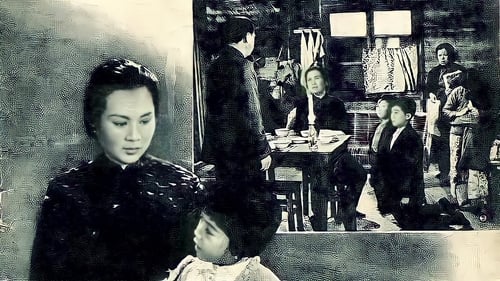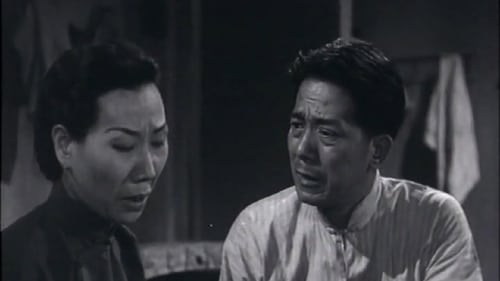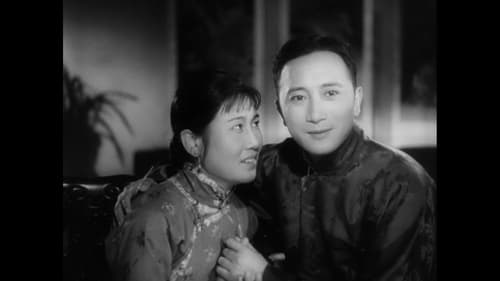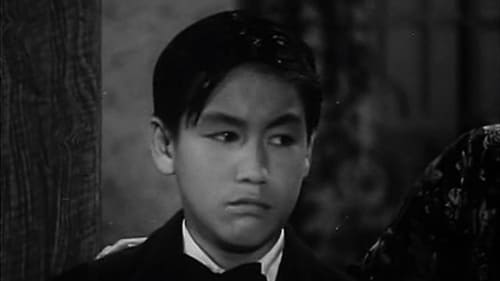
Jennie's father
Working as a telephone operator on the nightshift, David Lau received some calls from a woman for a David and agrees to a blind date. Wearing a violet on his lapel, David mistakes someone else for his date. Jennie Lee, a stranger, comes calling at the hotel, addressing a bewildered David with an intimacy that is familiar and awkward. Mok Yu-fuk, the self-proclaimed Sherlock Holmes, follows Jennie but gets robbed. Lau received an invitation to Jennie's birthday party. The guests acting strange at the party. Jennie and Lau take a stroll along the beach. Jennie suddenly hurls herself into the sea in a run. Five years ago, when Jennie was having a heart-to-heart talk with her fiance David Wong on the beach, her neglected brother ran off to the sea and drowned himself. Suffering from a nervous breakdown ever since, Jennie was devasted by the departure of her fiance to America. The hopes Jennie's parents are pinning on the new David to boost their daughter's recovery are merely wishes.

Associate Producer
Continuing from the first Jane Bond film, Black Rose (1965), Mei-yu and Mei-yu infiltrate the underground group of Golden Yanluo (Chinese: Judge of the Underworld) to save Man-fu and Nanny back.

Golden Yanlou/The boss
Continuing from the first Jane Bond film, Black Rose (1965), Mei-yu and Mei-yu infiltrate the underground group of Golden Yanluo (Chinese: Judge of the Underworld) to save Man-fu and Nanny back.

Producer
Orphan Lee Dan-hung is made a scapegoat by her cousin Chor Kwai-ping. Facing drug trafficking charges, Lee is released on parole with the doctor To King-chung as guarantor. Lee works as a sanatorium nurse. The modest caretaker, Matriarch To plays matchmaker for her son To Ngan-sing and Lee. Ashamed of her past, Lee listens to the doctor's advice and keeps the Tos in the dark. Chor returns and coerces Lee into colluding with smuggling ring by threatening to kill her newborn daughter. The reluctant Lee is arrested in a police raid together with the gang members but is later acquitted. With a reputation to defend, To toughens his heart and expels Lee. Lee leaves for Borneo with a touring opera troupe but a yearning for her daughter brings her back several years later. Feeling for the upset in-law, Matriarch To grants her stay until his son's return from business in a few months' time. When To returns, he decides to make up for the wasted time by bringing Lee and her daughter home.

Lee Chung-ling
Chuk Tai-ming elopes to Hong Kong with Shum Tsui-hung in defiance of his father but soon succumbs to harsh conditions and ill health. Shum becomes a courtesan to fulfil Tai-ming's last wish of funding his younger brother Chi-ming's studies in Australia, while creating the false impression that she is a rich widow. Chi-ming returns in summer and a chance encounter in the nightclub evolves into a budding romance. Tormented by a love doomed from the start, Shum pretends to despise the poor suitor. The rejection is taken hard by Chi-ming, who snubs the woman in public. Shum plunges into despair, taking gravely ill. Her lawyer Lee Chung-ling finally breaks the silence, making Chi-ming attuned to the woman's unspoken suffering after she's been laid to rest.

Producer
The creative person torn between ideals and reality is one of Chor Yuen's favourite characters in his 1960s films. Another favourite subject is the rose, not only featured in the title of several films but is also the name of the production company he formed with his future wife, Nam Hung, who also stars in most of its productions. Rose in Tears is in fact the company's inaugural project. The story features two painters, one famous and the other struggling but both infatuated with the same delicate rose of a woman, negotiating their ways through art, commerce and love. With this heart-tugging story, Chor finds a vehicle for his baroque impulses, relishing in lavish images and over-the-top emotions.

Cheung Tai-Shing
Married and with a son on the way, Zhang takes shelter in a big old house haunted by a ghostly female vampire.

Chan Chi-hong
Poor teacher Chan Chi-hong, his wife Lee Yuk-mei and their five children survive on his meagre pay. When he is laid off by two schools in a row, the family runs into difficulties. The children resort to begging on the streets to pay the mother's medical bills. Turning to writing, Chan's novel fails to find a publisher and, worse still, he comes down with tuberculosis. Dealt a further blow by the death of the youngest daughter and the pressures from the loan sharks, Chan contemplates killing himself and his family but changes his mind when he witnesses the sacrifices made by other parents for their children. He vows to be a dutiful father and tries his best to overcome their adversities. His novel is finally published and sells well. Through thick and thin, the family at last sees the light at the end of the tunnel.

Yu Kwok-Leung
Lee Sun-fung is renowned for adapting literary classics for the silver screen. To commemorate the seventh anniversary of the Union Film Enterprise known for producing quality films and co-founded by Lee, Human Relationships is adapted from writer Ba Jin's novel into film. The Yiu family moves into a manor. Mrs Yiu, while frustrated by the way her step-son is spoiled by her husband and mother-in-law, develops a friendship with a kid (Michael Lai) who steals flowers from the mansion's garden. She later learns that he is the son of the place's former owner whose downfall at middle age is the result of being spoiled when young. Lai was only a child but gained a foothold among seasoned veterans like Cheung Wood-yau, Ng Cho-fan and Pak Yin.

This tale of familial warfare and sacrifice takes place in hard-pressed Shanghai at the end of the 1940s. Hu Zhiqing can barely support his wife and children, and his situation is worsened by the unexpected arrival of his mother, brother and sister-in-law. When he is fired by his unscrupulous boss, the whole family becomes embroiled in one emotional/economic struggle after another.

Cheung Sai Wah
A delicious comedy from Union Film, Money, traces the journey of a bag of cash from a bank robbery. The humour switches between the witty and the absurd, offering a biting examination of human nature when men and women are confronted with the chance of unearned wealth.

Lau Mung-Mui
Lau Mung-mui chances on To Lai-leung and their encounter transcends to a rendezvous in their dreams. They admire each other, but they do not know each other's names and addresses. They keep on thinking of each other and decide to take each other as their future husband and wife. Mui's father wants his son to get married, but he pays no attention to his father's wishes. Mui leaves home to look for Leung. Leung's father forces his daughter to marry her rich and powerful cousin. Leung becomes despondent and dies, following an arranged marriage with her cousin. Mui sought everywhere for Leung for three years, but to no avail. He locates the home of Leung, but the household has moved out. The house is guarded by an old servant. Mui, chasing Leung's spirit, has a brief romance with her. Acknowledging that their union will be hindered by their incompatibility as a mortal and a spirit, Leung reincarnates as a mortal so that their love may be rekindled.

A Chinese musical fantasy

Wong Kei-shu
Though her marriage with rich businessman Chan Hak-lit is crumbling, Anna Poon refuses to accept her childhood sweetheart Wong Kei-shu's courtship. Anna's younger sister Mei-na has a crush on Shu and treats Lee Man coldly. When she sees Anna being with Shu, she taunts Anna with stealing who she likes. Anna is hurt and goes back to Chan's house. Chan holds a house party and invites business celebrities. Shu attends it and when tells Anna he loves her when they dance. Anna rejects him and tells him never to see her again. Chan goes to the racecourse. When Shu falls down from a horse, Anna faints. Chan asks Anna what her relationship with Shu is. He warns her not to have any wrongdoing and ruin his reputation. Shu is fine and asks Anna to meet for the last time. Anna cannot turn down him and goes to meets him. Lit miscomprehends the situation and files a divorce. He even forbids Anna to see their daughter. A distressed Anna becomes a victim of love in a conservative society.

Lorry driver
Reporter Yu Mong-yuen is recovering from a leg injury in his fiancee Man-wah's apartment. Bored, he looks out the rear window and observes the life of the neighbouring building. Among the tenants are a sugar-daddy and his mistress, a middle-aged man wants to marry a young girl, but she is in love with his son. Finally, she hatches a plot and makes the man agree to her marrying his son ; a sly fortune-teller ; a lively gym, a rich widow quarrels with the trainer of a gymnasium because his dog has bitten her cat ; and an opera school, a woman signs, leaning on the balcony, and a man tries to strangle her. In fact they are rehearsing an opera…… One evening, Wah is on the night shift, and Yuen watches the opera troupe rehearse to the end. Under the influence of drugs, Yu mistakenly believes that a divorced man has murdered a taxi dancer. He alerts the police, but the whole thing is nothing more than a misunderstanding.

Ming

Frank Wong Fuk-wan
Темной дождливой ночью деревенский кузнец находит на улице умирающую молодую женщину с младенцем на руках. Женщина говорит, что ее мужа подставили и посадили в тюрьму и просит позаботиться о Фрэнке (ребенке), после чего умирает. Прошло 10 лет. Однажды вечером, Фрэнк собирал на холме дрова и встретил беглого каторжника. Он приносит ему еду и инструменты, чтобы снять кандалы, а каторжник, узнав имя мальчика, говорит, что он знал отца Фрэнка. И просит мальчика усердно учиться и посвятить свою жизнь медицине, став врачом. Идут годы. Фрэнк учится в медицинской школе, а анонимный отправитель высылает ему деньги на учебу. Закончив обучение Фрэнк возвращается в родную деревню и хочет открыть больницу для бедных людей. Но в деревне уже есть больница, которой владеет самый богатый человек в округе Джэк То. Ему не нужны конкуренты и он всеми силами старается задавить Фрэнка…

Ko Kok-man
Hak-ming heads the Ko Family, but he and his brothers, Hak-ting and Hak-on, and the second wife of the late Master Ko quarrel. Young Cousin Mui, who has tuberculosis, is forced by to marry an older woman. Kok-sun is guilty of being unable to stop the marriage. Sun and maid Chui-wan are wary of their feelings for each other due to class difference. Cousin Mui dies of illness. Hak-ting has his eyes on Wan. His wife, Wong, complains to their daughter, Shuk-ching, who cannot take it and commits suicide. Wong blames herself for her death. Undergone these tragedies, Cousin Kam's mother let Kam have a modern wedding with Kok-man. When Ming is ill, Ting and On want to sell the ancestral home. Hak-ming dies of angst. When the fifth uncle of Sun forces Wan to be his concubine, Wan tries to kill herself but is intercepted by Sun. Pressurised by people of the house over the issue of inheritance, Sun protests by declaring his love for Wan and leaves the family, with his mother, brother Man and Wan.

Ng Kwun-sing
After seeing a friend of his boss' son adopted over his promised promotion with connections, Shrimp's father, a minor white-collar worker Ng Kwun-sing, vows to get Shrimp a place in a prestigious school and a chance to make friends with the rich. However, Shrimpy is constantly bullied and discriminated against by his classmates. Ng has not the means to be a social climber and finally realises his mistake. He sends his son to a voluntary school so that he may grow up happily. This poignant father-son drama shows a parents' willingness to carve out a good future for their children by any means necessary.

Ko Kok-man
Ko Suk-ying is saddened over her arranged marriage as manipulated by her father Hak-ming. Ko Kok-sun's Cousin Chow Wai's spends the Mid-Autumn Festival before her marriage with the Kos. She has been in love with Sun. Sun finds out about her love for him when she is about to be married off, he is too weak to oppose to Wai's betrothal to another man. Sun's son, Hoi-sun, falls ill. Fearing the displeasure of his elders, Sun dares not consult a western doctor.
Meanwhile, another dispute arises among members of the family over the ancestral land. When accused of being incompetent in his management, Sun takes the blame silently. Wai dies of grief while Hoi-sun becomes a victim of mistreatment. Sun is devastated at this double blow.
Hak-ming instructs Sun to arrange for Ying's wedding. Knowing the kind of man Ying's fiancee is, Sun is reluctant. Not wanting to follow in Wai's footsteps, Ying fights for her own rights, and backed by an enlightened Sun, she leaves for a new start.

Ko Kok-man
"Family" (1953), which launched the Union Film legacy, "Spring" (1953) and "Autumn" (1954) are adaptations of Ba Jin's highly regarded novel "Torrent Trilogy". In "Family", director Ng Wui skilfully condenses the voluminous first part of the novel into an emotionally powerful and intellectually focused story of youngsters struggling to survive oppression and repression in a feudalistic family. This well-received film quickly established the company's reputation.

Ah-sang/Tin-sang - adult
Ах Нгор, служанка, забеременевшая от мастера Чан Инг-Кита. У нее небыло выбора, кроме как поручить заботу о сыне Тинь-Сане главе больницы. Доктор женится снова, передав младенца медсестре. Она часто пропускает работу и идет домой, чтобы увидеть его. Следовательно, г-жа Лэм увольняет её. Она заболевает и умирает, её азартный муж продает Тинь-Сана Чансу. Сан убегает, начинает красть и скрывается в больнице для слепых. Ему дают убежище глава больницы и его жена. Там он встречает Ах Лин, слепую девочку, которая была его другом, когда они были молодыми. Он растет и хочет стать превосходным хирургом-офтальмологом, и возвращает Ах Лин зрение. Когда Сан объявляет, что он хотел бы назвать госпожу Ли своей матерью, интрига исчезает, родители прибывают, стуча в его дверь. Кит также приезжает, чтобы попросить денег, но Ах Нгор показывает свое негостеприимство и выгоняет его. Сан наконец-то признаёт свою мать.

San as adult
Ах Нгор, служанка, забеременевшая от мастера Чан Инг-Кита. У нее небыло выбора, кроме как поручить заботу о сыне Тинь-Сане главе больницы. Доктор женится снова, передав младенца медсестре. Она часто пропускает работу и идет домой, чтобы увидеть его. Следовательно, г-жа Лэм увольняет её. Она заболевает и умирает, её азартный муж продает Тинь-Сана Чансу. Сан убегает, начинает красть и скрывается в больнице для слепых. Ему дают убежище глава больницы и его жена. Там он встречает Ах Лин, слепую девочку, которая была его другом, когда они были молодыми. Он растет и хочет стать превосходным хирургом-офтальмологом, и возвращает Ах Лин зрение. Когда Сан объявляет, что он хотел бы назвать госпожу Ли своей матерью, интрига исчезает, родители прибывают, стуча в его дверь. Кит также приезжает, чтобы попросить денег, но Ах Нгор показывает свое негостеприимство и выгоняет его. Сан наконец-то признаёт свою мать.

Chinese Opera comedy from Hong Kong directed by Fung Chi-Kong.

Shoe Salesman
A shoe salesman and a tailor respectively fall in love with two sisters, Yuk-sin and Yuk-ling, both reputed singers on the radio. The men devise various schemes to meet the two women. Fourth Aunt, the sisters' mother, treats the two women as commodities to be traded off to the highest bidder, greedily making money off their talents by arranging lucrative concerts. The shoe salesman and the tailor disguise themselves as rich men to get close to their dream lovers. Finally, the sisters are won over by true love.

Hung Siu-Kong
Drama from Hong Kong directed by Ng Wui

Cheung Si-Ho
Comedy from Hong Kong directed by Yeung Kung-Leung.

"Red and White Azaleas" (alias "重訂今生未了緣"), a Hong Kong film produced by the Red and White Film Company, was released in 1951.

Ling Siu-Ngan
Drama from Hong Kong directed by Ng Wui.





















